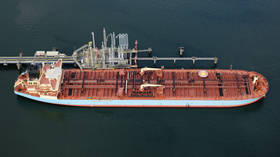Western firms ignoring G7’s Russian oil ‘price cap’ – Bloomberg
US and EU companies have continued to provide shipping services after prices breached the $60/barrel ceiling, the outlet reports
Exports of Russian oil loaded onto Western-insured tankers are continuing even though the price of Urals grade has jumped above the $60 per barrel cap set by the Group of Seven (G7) countries and the European Union, Bloomberg reported on Monday.
According to the news agency, about 40% of vessels carrying crude from Russia’s Baltic and Black Sea ports were either owned or insured by companies based in countries that signed up to the price cap.
Urals was trading at about $71 a barrel on Friday at Russia’s ports, according to Argus Media. About half of the tankers taking on Russian oil were Western-owned before the limit was breached, with a large number of vessels having insurance routed through London, the outlet said.
The price cap on Russian seaborne oil exports of $60 per barrel was introduced by the EU, G7 countries, and Australia on December 5. It bans Western companies from providing insurance and other services to shipments of Russian oil unless the cargo is purchased at or below the set price.
“Though technically the price of Russian oil needs to be $60 or less in order for companies in the US, EU or G7 to provide services such as vessels and insurance, all the firms need to do so in practice is receive a written pledge – called an attestation – that the cargo was purchased below that threshold,” the outlet wrote.
“We are monitoring the market closely for potential violations of the price cap,” said Megan Apper a spokesperson for the US Treasury. “It is worth noting that trades above $60 that do not use Coalition services are not in violation of the price cap and a substantial proportion of Russian oil trades still use coalition service providers.”
Meanwhile, tanker owners and insurance companies have argued that they cannot know the exact price a crude cargo trades at since the Western price cap was imposed, as longer-term deals could differ from short-term market prices.
Russia’s Urals crude exceeded the price cap in mid-July for the first time since the mechanism was implemented.
For more stories on economy & finance visit RT’s business section
You can share this story on social media:








Comments are closed.